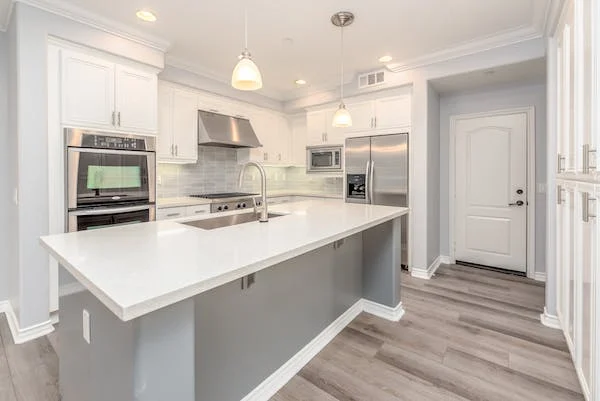Mistakes to Avoid When Renovating Kitchen Floors

There is nothing more satisfying to a homeowner than having a renovated kitchen, and no less transformative of a change than installing new kitchen floors. They can make a space appear lighter, brighter, and even bigger. New kitchen floors can give your whole room a new lease on life.
However, as flooring contractors, we’ve seen countless people rush into kitchen floor renos without really thinking the changes and choices through. That’s why we’ve created this blog: to help you stay on track—and relatively stress-free!
Mistakes to Avoid When Renovating Kitchen Floors
If you’re about to rip up your kitchen floors, these are the most common hiccups you can avoid if you plan ahead.
The Wrong Material
As tempting as it may be to install any flooring material in your kitchen, the truth of the matter is flooring materials aren’t created equally.
If, however, you’d like to do some shopping around then, generally speaking, these are the best flooring choices for your kitchen:
- Bamboo: If your first love is hardwood flooring, and you’re not keen on installing it in your kitchen, then bamboo is a viable alternative. Bamboo looks and feels similar, but it’s more durable. Not only is bamboo more durable, but it’s also moisture resistant so it can handle stains and spills with ease. The downside to bamboo is it costs more than hardwood and may require professional refinishing.
- Ceramic Tiles: For super-durability, look no further than ceramic tiles as they are water, stain and heat resistant. Ceramic tiles also come in a wide variety of patterns and styles to choose from, making them a perfect option no matter your taste.
- Natural Stone Tiles: Akin to ceramic tile, natural stone tiles are highly durable and can add a luxurious feel to your space. The downside to stone is it’s porous, so you’ll have to apply sealant annually to prevent stain and moisture damage.
- Vinyl: If you’re considering vinyl, as experienced flooring contractors, we suggest luxury vinyl flooring (LVF) as it’s easy to care for and can last a decade before it begins to fade. Plus, with LVF, they come in patterns that resemble stone or wood; at a fraction of the cost!
Improper Flow or Room Transition
When you’re laying flooring in the kitchen, you have to consider how it’ll tie in with the adjoining rooms. Now, this doesn’t mean you have to carry kitchen flooring into the next living space — unless you want to — it just means you have to ensure that the flooring matches and is installed at the same height. Another consideration is determining where to transition for optimal flow.
Unrealistic Budget

As with any home renovation project, you have to set a realistic budget. If you set aside insufficient funds and you encounter unforeseen problems — this frequently happens — you’ll need to have money set aside in reserve to cover any additional costs. With flooring the most common cost that may pop-up is repairs to unseen damage of your subfloor
Not Considering Professional Flooring Contractors

If you’re unsure how to install flooring, or want to ensure it’s done right the first time, hiring a licensed flooring contractor may be something to consider. And hiring the wrong one can be a pain in your planning and pocket. Here’s what you get when hiring the right professionals:
- Faster installation
- Satisfaction guaranteed
- Licensed contractors are fully accountable for their work
- Help throughout the whole process
- Can provide materials at a discount
How to Painlessly Renovate Kitchen Floors
Renovating your kitchen floors doesn’t have to be stressful. Granted, you’ll have to spend some time planning your renovation by finding the right flooring, considering room transitions, setting a realistic budget and determining if you should hire a professional flooring contractor. If you dedicate some time and energy planning your kitchen flooring installation, then you stand a better chance of enjoying the process.
If you have a question about which flooring material is best for your kitchen, don’t hesitate to drop us a line! We offer free consultations and are happy to help.



